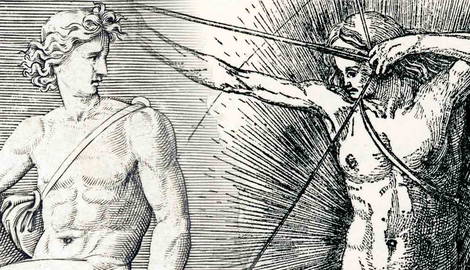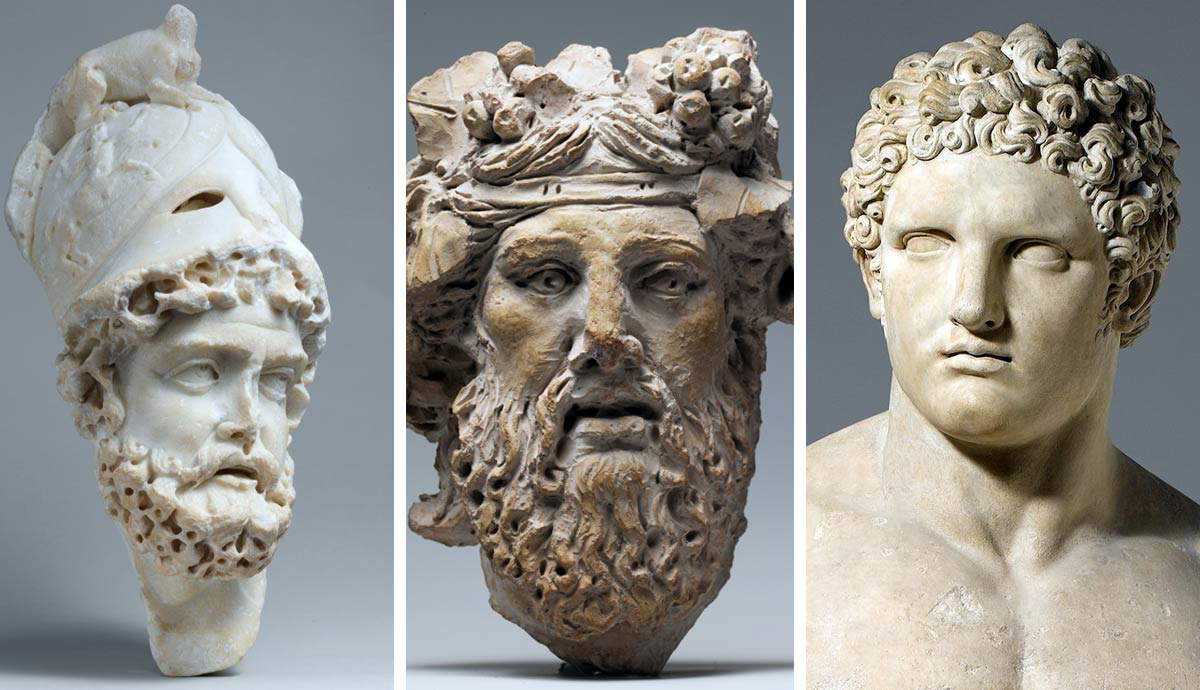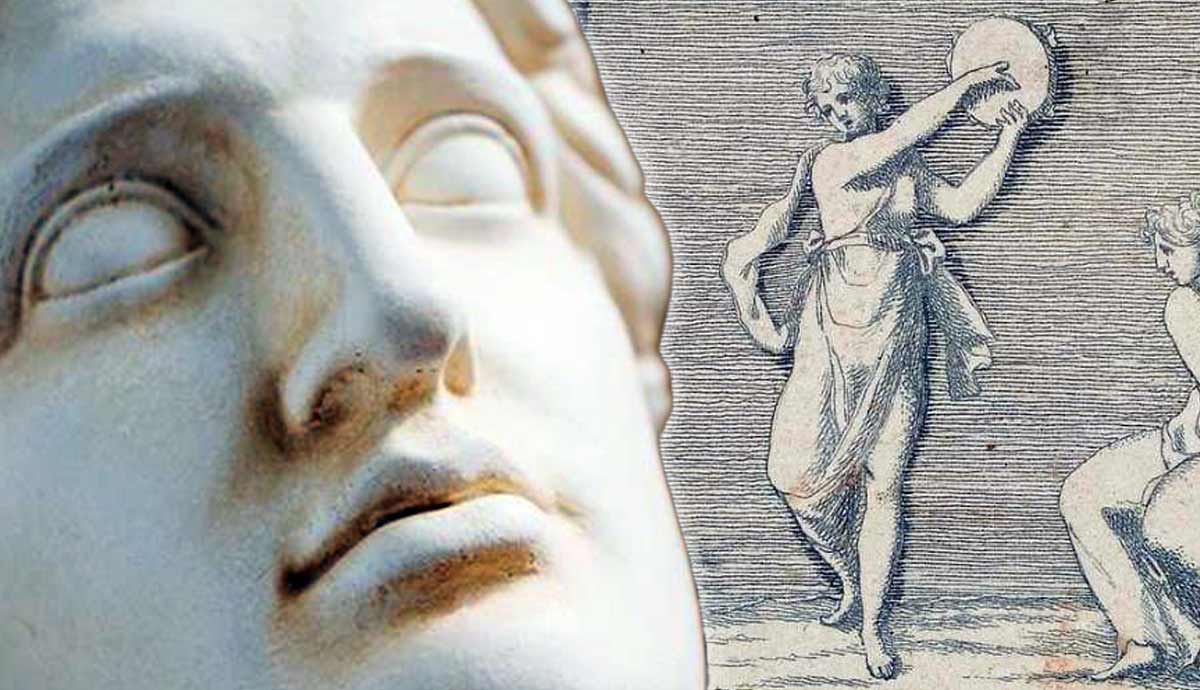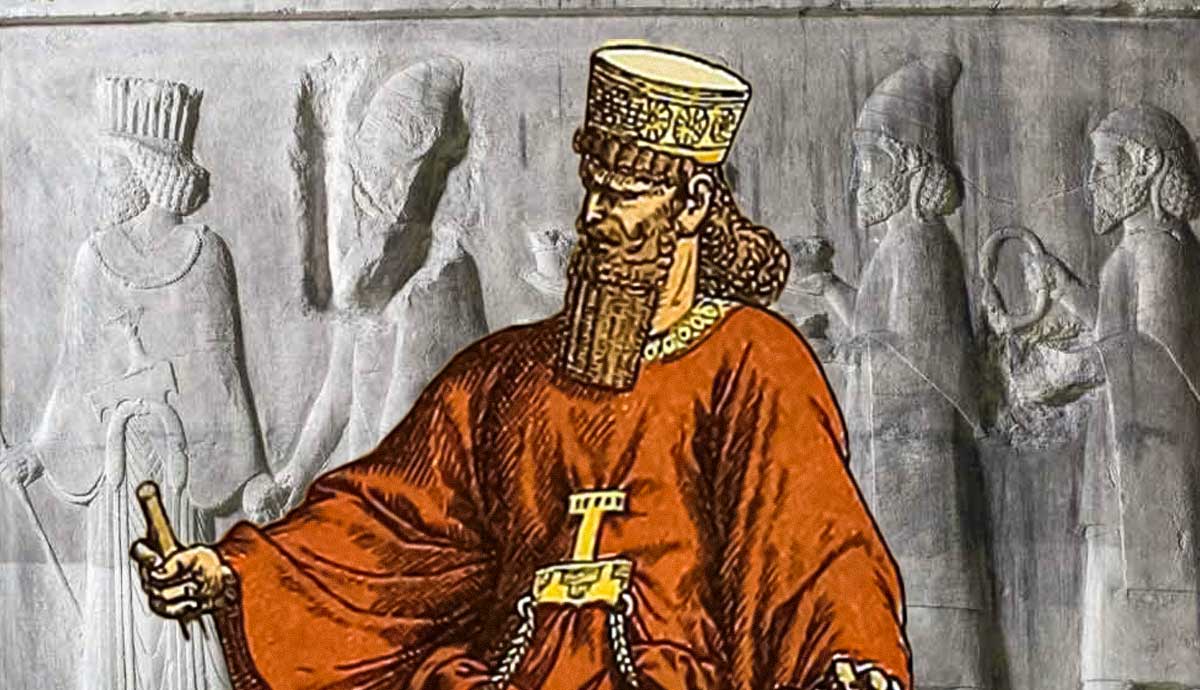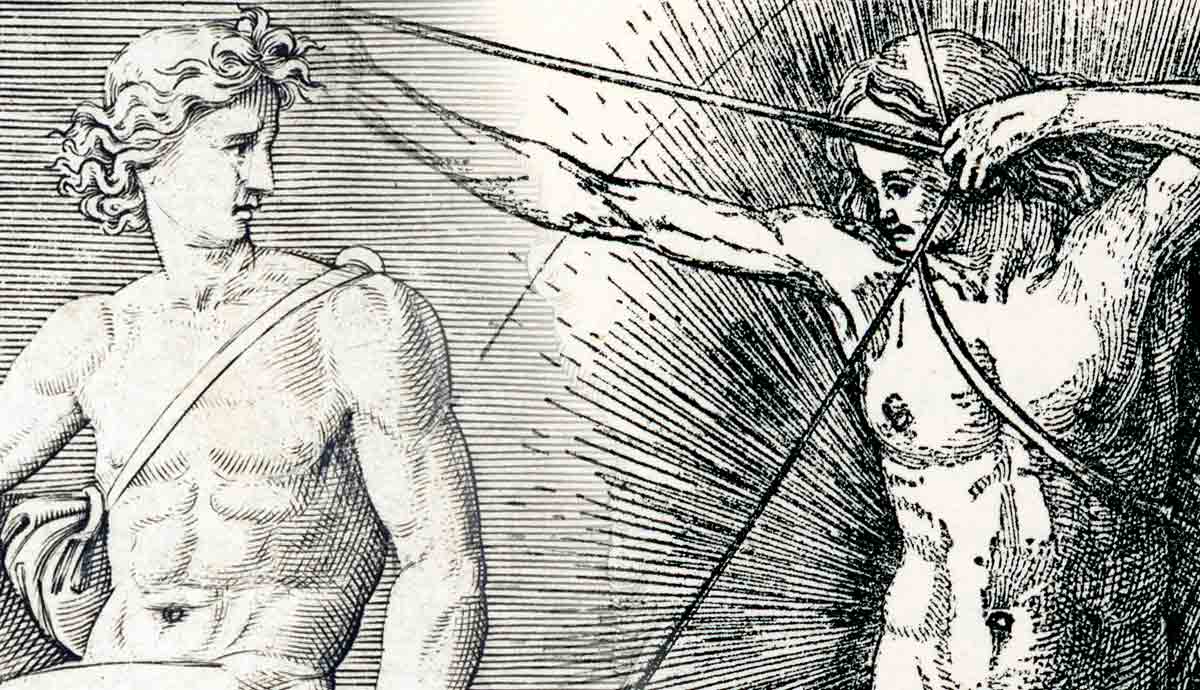
Apollo is one of the most important gods in Greek mythology. A son of Zeus and one of the 12 Olympians, Apollo was the god of prophecy, music, healing, disease, and light. He was usually depicted as a youth and the embodiment of male beauty, carrying a lyre and wearing a laurel wreath. He was widely worshiped across the Greek world, but especially at Delos, the island of his mythical birth, and at his oracular shrine on Delphi.
Below are ten of the most important and interesting myths about the Greek god Apollo.
1. The Birth of Apollo

Apollo was born to the goddess Leto by her union with Zeus. In Hesiod’s Theogony, Leto was Zeus’ sixth wife and she bore the twins Apollo and Artemis before he took Hera as his seventh and last wife. Yet a popular story suggests that Zeus was already married to Hera when he had an affair with Leto.
Hera was famed for her jealous and vindictive nature, especially when it came to Zeus’ extramarital relations. Goddesses usually didn’t suffer her wrath as mortals did, but Leto was different. In Callimachus’ Hymn IV, the poet wrote that Hera was especially angry with Leto because she was to give birth to a son more beloved to Zeus than Hera’s own son, Ares.
Hera kept watch over Leto’s pregnancy. When the goddess was in the throes of labor, she prevented her from giving birth. Hera also sent Ares to threaten any city that dared to give refuge to the pregnant goddess. Every city on the mainland and every island in the Aegean refused her, except for one barren island called Asteria. It called out to Leto as she passed and welcomed her. When Apollo was born, the island was renamed Delos.
According to the Homeric Hymn 3 to Delian Apollo, when Leto set foot on Delos, she asked for refuge and promised that if they built a temple to Apollo, they would want for nothing. She said that visitors from far and wide would come to give sacrifices and tribute at the temple and that the inhabitants of Delos would be able to prosper “from the hand of strangers.” Delos wasn’t rich in cattle, nor did it have fertile soil for agriculture, so the island agreed to Leto’s proposal.
2. Slaying Python

Python was a son of the primordial earth goddess Gaia and had the appearance of a great serpent or dragon. The 2nd-century CE author Apollodorus recounted that the dragon was the guardian of the oracle at Delphi, which, at that time, was presided over by the goddess Themis. The dragon prevented Apollo from entering a chasm said to be the source of gasses that the priestesses breathed in to give their prophecies, so Apollo killed the beast and took over the oracle.
An account by Hyginus in Fabulae 140 gives an alternate reason for Apollo’s slaying of the dragon. Python was fated to die at the hands of one of Leto’s children, so when the dragon discovered she was pregnant, it went out from its home at Delphi to try and kill her. Zeus protected Leto and brought her to Delos. Four days after she had given birth, Apollo went to Delphi and killed Python. This earned him the epithet Pythian, and Apollo established games in his own honor, called the Pythian Games.
3. The Pursuit of Daphne

Daphne was the daughter of Amyklas, a king of Sparta. She shunned normal society and instead spent her time hunting. For this reason, Artemis, one of three virgin goddesses, took a liking to her. While she was out hunting in Elis, a man named Leukippos fell in love with her. He disguised himself as a maiden and joined her in her hunts. Over time, they grew close and were always at each other’s sides.
Apollo was also in love with Daphne, and he grew jealous of Leukippos. In his anger, Apollo put it into Daphne’s mind to take her young maiden attendants to a stream to bathe. They all stripped off their clothes and jumped in. But when they saw that Leukippos didn’t follow suit, they tore his clothes from him. Realizing that he had been deceiving them, they all stabbed him with spears. With Leukippos out of the way, Apollo tried to rape Daphne, but she ran away. In her flight, she begged Zeus to protect her, so he turned her into a laurel tree.
Another account was made famous by the Augustan-era poet Ovid in his Metamorphoses. He wrote that after Apollo slayed Python, the god noticed Cupid drawing back his own bow. Apollo insulted him, saying that the weapon was for someone of his own stature and that Cupid should content himself with his torch and love affairs. As revenge for the slight, Cupid shot two of his arrows: a gold one into Apollo and a lead one into Daphne, who, in this account, is the daughter of the river god Peneus. Apollo fell madly in love with the maiden, while Daphne wanted nothing to do with him. He pursued her relentlessly, and she fled as a lamb flees a wolf. She begged her father to protect her by taking her beauty away, so he transformed her into a laurel tree.
4. Killing the Children of Niobe

Niobe was the daughter of Tantalus and wife of Amphion. With her husband, she had twelve children, six sons and six daughters. Some traditions claim more or less children, but they all agree that Niobe boasted about how she was more blessed with children than Leto. The goddess was so insulted by this that she incited Apollo and Artemis to take revenge for her.
Artemis killed all of Niobe’s daughters, and Apollo killed all her sons. In her grief, Niobe returned to her home country of Phrygia, where she was turned to stone. According to Pausanias, there was a stone on Mount Sipylus that, if looked at from the proper distance, resembled a woman weeping.
5. Musical Contest With Marsyas

Marsyas was the son of the Phrygian mountain god, Olympus (not to be confused with Mt. Olympus, the home of the Olympian gods). Some accounts say he was a peasant or a satyr, but they all place him in Phrygia.
He came across a flute that Athena had thrown away, so he picked it up and started to play. He practiced and became so confident in his skill that he challenged Apollo to a musical contest; he with his flute and Apollo with his lyre.
For a moment, it seemed like Marsyas was going to win. But Apollo flipped his lyre upside down and continued playing. Marsyas couldn’t do the same with his flute, so victory was given to Apollo. As punishment for Marsyas’ hubris, Apollo tied him to a pine tree and flayed him.
According to Hyginus’ Fabulae 191, King Midas sat as one of the judges in this contest. The king noted that he thought Marsyas should have won, so Apollo declared that “what heart you had in judging, so too shall be the ears you have.” At once, his ears became those of a donkey.
6. Service at Troy

Several passages in Homer’s Iliad describe how Apollo, along with Hera, Poseidon, and Athena, plotted to overthrow Zeus. They chained him to his throne, and it was only through the intervention of Thetis that their coup failed.
As punishment, Apollo and Poseidon were tasked with serving the king of Troy, Laomedon, for a year. The king made Apollo shepherd his goats and tasked Poseidon with building walls around the city. But once their service had ended, Laomedon refused to pay them for their work. He even threatened the two gods, saying he should tie them up, cut off their ears, and sell them as slaves. In response, Apollo set a deadly plague upon the city, and Poseidon flooded the plains.
In Apollodorus’ Library of Greek Mythology, the mythographer states that Apollo and Poseidon wanted to test the arrogance of Laomedon, so had taken human form and offered to fortify the city in return for pay.
7. The Birth and Death of Asclepius

Apollo had once fallen in love with a woman named Coronis. He impregnated her, and set a crow to watch over her and prevent anyone from violating her. But she was in love with another man. Coronis had an affair while pregnant, and when the crow delivered this news to Apollo, the god turned the crow black.
Zeus struck down the lover, and Apollo himself killed Coronis. While her body was on the funeral pyre, Apollo remembered that she was pregnant, so he saved the unborn child from the fire and brought him to be raised by the centaur, Chiron. This child was named Asclepius.
Raised and trained by Chiron, Asclepius became skilled in medicine. He was so skilled that he was even said to have the ability to save the dying and bring the dead back to life. Zeus feared that he would teach this skill to mortals, so he struck Asclepius down with a thunderbolt. Devastated by his son’s death, Apollo killed the Cyclops that had fashioned the thunderbolt for Zeus.
8. Service to Admetos

Zeus wanted to hurl his son into Tartarus for killing the Cyclops, but Leto intervened. Apollo’s punishment was to be a slave for a year in service to Admetus, the king of Pherae. The god was tasked with caring for the king’s herds, and throughout the year, the king treated Apollo with great kindness.
To show his gratitude, Apollo helped Admetos in the contest that won him his wife, Alcestis, the princess of Iolcos. Her father issued a challenge to any would-be suitors that he would give his daughter to whoever could yoke a lion and a boar to a chariot. Admetos asked Apollo for help, so the god brought him the animals already yoked, allowing Admetos to win Alcestis’ hand.
At the king’s marriage to Alcestis, while offering sacrifices to the gods, the king forgot to sacrifice to Artemis. Later, when he went back to his bed-chamber, he found it filled with snakes, a portent of death. Apollo told the king to appease Artemis, then he went to the Fates and demanded that when Admetos was about to die he could be freed from death if someone else willingly took his place.
When the time came for the king to die, he assumed that one of his parents would take his place. But when neither of them did, Alcestis volunteered. The 5th century BCE playwright Euripides’ in Alcestis describes the events of her death and shows how her sacrifice broke Admetos’ spirit. They were later reunited when Herakles wrestled with Death to bring Alcestis back to her husband.
9. Cursing Cassandra

Another of Apollo’s loves was the Trojan princess Cassandra. Hoping to have sex with her, he promised to teach her the art of divination. Cassandra agreed to his proposition, but once she had learned, she refused to honor the agreement. In anger, Apollo made it so that no one would believe her prophecies. This had disastrous consequences for Troy, as she foresaw the city’s fall but couldn’t convince anyone to listen. She also foresaw the death of Agamemnon at the hands of his wife, Clytemnestra.
10. The Iliad and the Death of Achilles

Before the opening of the Homeric epic, the Greeks had been at war with Troy for nine years. They had attacked towns and temples and gathered up the spoils of war. One of those spoils was Chryseis, daughter of a priest of Apollo. The priest had gone to Agamemnon to beg for his daughter’s release, offering a large ransom in exchange, but the Greek king refused and sent him away. The priest prayed that Apollo would bring a plague upon the Greeks, and so the god did.
The plague raged for nine days, until a Greek seer, Calchas, was called to divine and assuage the god’s anger. Calchas replied that in order to appease Apollo, Agamemnon needed to return Chryseis to her father. Agamemnon was furious but agreed on the condition that he be given a new prize. The one he chose was a girl that Achilles had taken for himself named Briseis. This was the event that caused the rift between Achilles and Agamemnon that spanned the majority of the narrative.

Throughout the epic, Apollo frequently aided the Trojans. He came to the aid of Aeneas when he was at the mercy of Diomedes, whisking him away on gray clouds. He also participated in the death of Patroclus, a close friend or lover of Achilles. Apollo shrouded himself in mist and snuck up on the warrior, then struck him in the back and knocked his helmet off his head. He then tore the breastplate off Patroclus’ chest, which allowed for a Greek warrior to spear him in the back. As Patroclus was retreating, Hector found him and plunged a spear through his stomach, killing him.
Apollo also had a hand in Achilles’s death. Achilles himself remarked on his fate to die by Apollo’s arrows. However, sources disagree on whether Apollo guided the arrow that killed him or whether he shot it himself. Apollodorus wrote that Achilles died by Paris and Apollo, while another version written by Hyginus in Fabulae 107 states that Apollo took the form of Paris and shot Achilles in the ankle, the one place where he was vulnerable.
